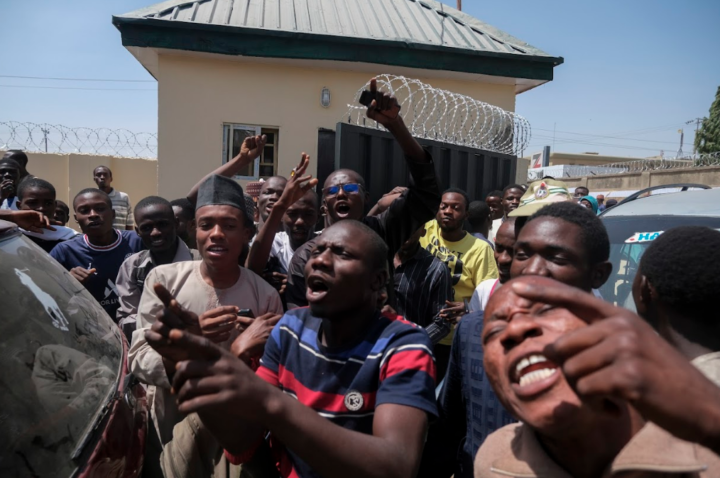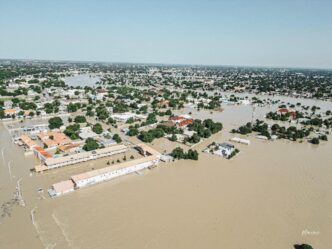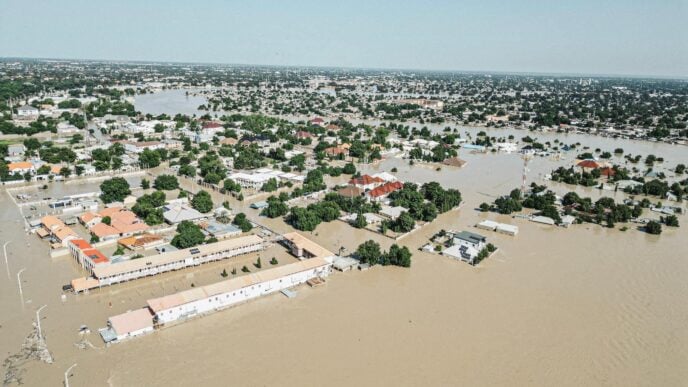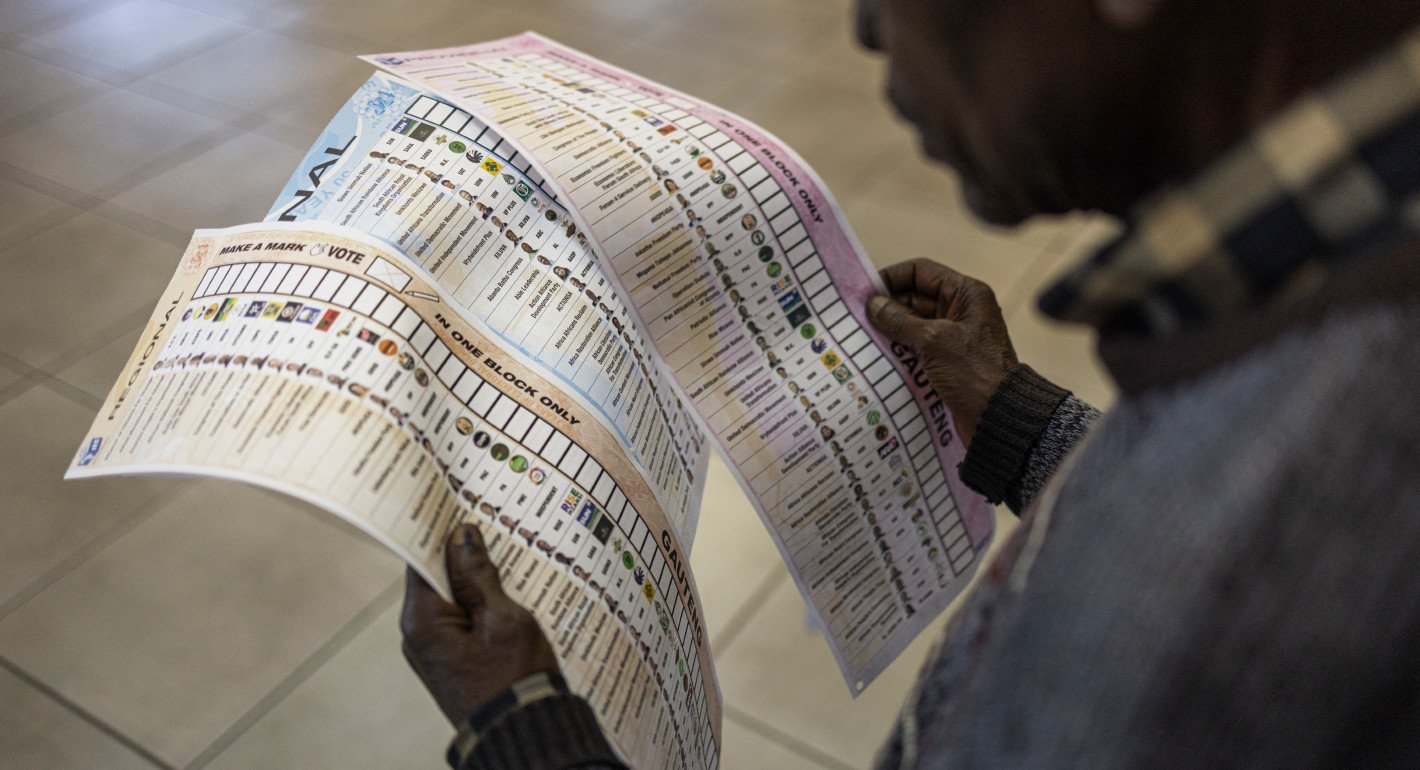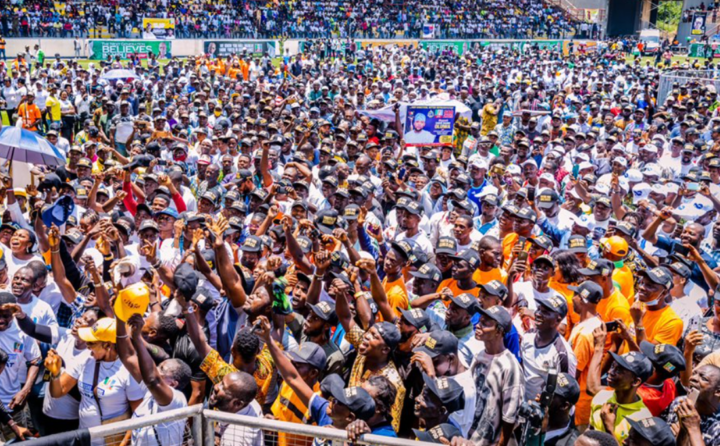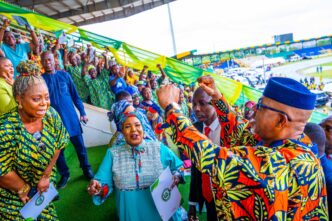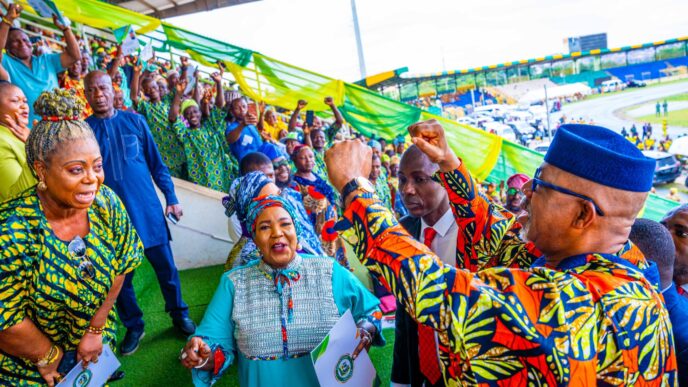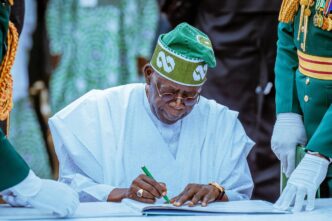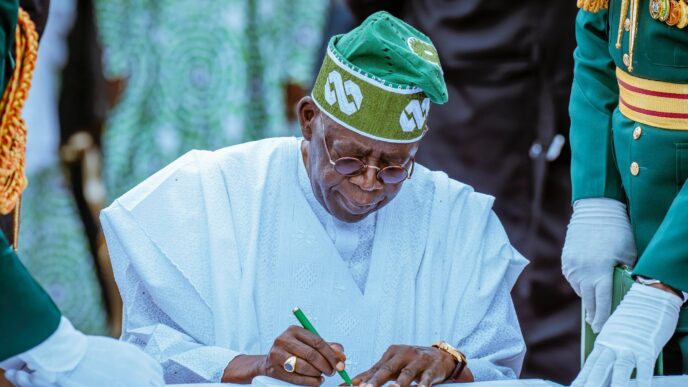Electoral officers protest about non payment of allowance
and intimidation by thugs at the venue of the Independent
National Electoral Commission (INEC) collation center
after elections in Kano State.
Photograph by Sodiq Adelakun/CCIJ
BY EKAINU MELCHIZEDEK AKOUNDO
Nigeria, Africa’s most populous nation, has been embroiled in a wave of protests that have left many wondering what sparked the flames of discontent. The recent demonstrations have brought together a diverse coalition of Nigerians from all walks of life, united in their frustration with the government’s handling of the economy and its policies. According to a report by the Nigerian Bureau of Statistics, the country’s inflation rate has soared to a 17-year high, leaving many Nigerians struggling to make ends meet (NBS, 2023).
But beneath the surface of this uprising lies a complex web of issues that have been simmering for years. As the situation continues to unfold, many are seeking clarity on the protesters’ core demands and debating the government’s response to the legitimate concerns of its citizens, whom it was elected to represent and serve.
The spark that ignited the flames
The immediate cause of the protests was the government’s decision to remove subsidy, leading to a sharp increase in petrol prices. This move was part of a broader effort to implement economic reforms and reduce the country’s reliance on oil exports. However, the timing and manner of the policy’s implementation were widely criticised, with many arguing that it would disproportionately affect already vulnerable populations.
Advertisement
There are allegations that the protests are inorganic and sponsored by the government enemies for regime change but I believe that these claims are unfounded and divisive. While some external forces may be exploiting the situation for their gain, the protests are largely a grassroots movement driven by Nigerians’ desire for better governance and improved living conditions. Dismissing the protests as inorganic or sponsored undermines the legitimate concerns of citizens and ignores the very real issues that need to be addressed.
Underlying issues fuelling the protests
Nigeria’s economic struggles have created a fertile ground for discontent. The country’s economy has been plagued by high levels of poverty and unemployment, with the World Bank reporting that over 40 percent of Nigerians live below the poverty line (World Bank, 2022). This economic hardship has been exacerbated by widespread corruption and mismanagement of public funds, which has eroded trust in government and fueled perceptions of inequality.
The rising cost of food has taken a devastating toll on everyday Nigerians. Aisha, a mother of three in Kano, can no longer afford to buy enough food for her family. Her children often go to bed hungry, leading to malnutrition and stunted growth. This not only affects their health but also their ability to focus in school, setting them back in their education and prospects.
Advertisement
Furthermore, Nigeria is one of the most unequal countries in the world, with vast disparities in wealth and access to resources. The country’s elite has been accused of accumulating wealth at the expense of the majority, leading to widespread resentment and frustration. These underlying issues have created a sense of hopelessness and desperation among many Nigerians, who feel that the government is out of touch with their needs and concerns.
Corruption has become a major obstacle to economic growth and development. Ahmed, a farmer in Sokoto, can’t access government subsidies and loans due to corrupt officials demanding bribes. He’s forced to rely on predatory lenders, trapping him in debt and poverty. This stifles agricultural growth and food security, perpetuating a cycle of poverty and inequality.
The consequences of these issues are far-reaching and devastating. Families are struggling to survive, and the future of Nigerian children is being jeopardized. The lack of access to education and healthcare is perpetuating cycles of poverty and inequality, making it even more challenging for individuals to break free from the shackles of economic hardship.
The protesters’ demands and government response
The protesters have presented a range of demands, including the reversal of the fuel subsidy removal, improved economic governance, and increased transparency and accountability. They have also called for the government to address the country’s pervasive corruption and inequality, and to take concrete steps to improve the lives of ordinary Nigerians.
Advertisement
The government’s spending habits have been a subject of concern, with many instances of wayward expenditure. For example, the acquisition of luxury items such as private jets and cars for personal use, as well as the allocation of billions for the renovation of official residences, raises questions about priorities. Furthermore, the recent allocation of 20 trucks of rice per state, valued at millions, as a response to the protests, has been criticized as an insult to the people’s intelligence and a gross misallocation of resources.
The new minimum wage, while a step in the right direction, falls short of addressing the economic realities of Nigerians. With the cost of living having increased by over 300%, the minimum wage does little to alleviate the suffering of the average citizen.
Moreover, the response of the security forces to the protests has been brutal, resulting in the loss of lives and injuries to many. The right to peaceful assembly and protest is a fundamental human right, and the government’s actions have only served to erode trust and fuel further discontent.
It is imperative that the government takes a critical look at its spending habits, prioritizes the welfare of its citizens, and addresses the underlying issues driving the protests. Anything less would be a betrayal of the people’s trust and a recipe for further instability.”
Advertisement
Implications and future direction
The recent protests in Nigeria have exposed the deep-seated frustrations and despair of the common man. The government’s inability to address the underlying issues has created a sense of hopelessness, fueling the protests. I foresee another protest in the future, as the grievances of the people remain unaddressed.
The common man in Nigeria hopes for a better life, free from corruption, poverty, and inequality. They yearn for a government that truly represents their interests and works towards their welfare. The protests have shown that Nigerians are willing to stand up for their rights and demand change.
Advertisement
However, the hope of the common man is dwindling. The government’s response to the protests has been dismissive and oppressive, indicating a lack of willingness to listen to their concerns. The future looks uncertain, and it may take more protests and struggles for the government to acknowledge the people’s demands.
Nigeria is at a crossroads. The government can either choose to listen to the people and work towards reform, or continue down a path of oppression and risk further unrest. The common man has shown remarkable resilience and determination, but their hope is fading fast. It’s time for the government to act and restore faith in the system.
Advertisement
Conclusion
The recent protests in Nigeria are a symptom of deeper issues in the country’s socio-economic landscape. The government’s decision to remove subsidy may have sparked widespread outrage, but a range of underlying factors, including economic hardship, corruption, and inequality drove the protests. To address the protests and prevent future instability, the government must engage with the protesters and implement meaningful reforms. This includes addressing the country’s pervasive corruption and inequality, improving economic governance, and increasing transparency and accountability.
Ultimately, the protests represent an opportunity for Nigeria to re-evaluate its economic and political systems and make meaningful changes to address the needs and concerns of its citizens. If the government seizes this opportunity, it could lead to increased trust and cooperation between citizens and the state and a more stable and prosperous future for Nigeria.
Advertisement
As the situation continues to unfold, Nigerians must remain vigilant and demand meaningful change. The international community must also hold the Nigerian government accountable for its actions and support civil society organizations working towards a more just and equitable society.
In my observation, the protests represent a turning point for Nigeria. The government has a choice to make: engage with the protesters and implement meaningful reforms, or continue down a path of repression and instability. The future of Nigeria hangs in the balance.
Ultimately, the success of the protests will depend on the government’s willingness to listen to the demands of its citizens and make meaningful changes. If they fail to do so, the protests are likely to continue and potentially escalate, leading to further instability and conflict. But if they seize this opportunity to reform and rebuild, Nigeria could emerge stronger and more united than ever before
Ekainu Melchizedek Akoundu, an NYSC member at IPCR, can be contacted via [email protected]
Views expressed by contributors are strictly personal and not of TheCable.
